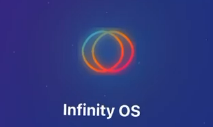A first test version of Infinity OS desktop has been released by builder @dehypokriet, bringing a streamlined way to manage and develop applications within the Caffeine AI ecosystem. Currently in version 0.9, the desktop build is part of a broader effort to create an operating environment for decentralised app use and creation, all powered directly through the browser.
The idea behind Infinity OS is to give users and developers a unified interface to access their own projects and explore tools from others in the Internet Computer and Caffeine communities. Rather than treating apps as isolated tools, the system aims to bring them into a shared, flexible environment that functions more like a desktop operating system.
Built with Caffeine AI, the Infinity OS lets users work on their apps, access apps built by others, and apply to be included in the utility’s broader app package. Everything runs inside a single downloadable application, removing the need for multiple installations or heavy browser-based tab management.
At this early stage, the v0.9 release is focused on refining core functionality and testing user experience. While not a final version, it lays the groundwork for a more cohesive experience within the broader decentralised app space. According to the developers, the idea is to eventually let users run all their preferred Caffeine-built or Internet Computer ecosystem apps through a single interface, whether they’re creators or everyday users.
The build supports developers who want to create within the OS directly, using the Caffeine app for UI and interaction. It also makes it easier for users to explore new apps without having to track them down individually or manage multiple accounts and browser sessions.
Caffeine AI, known for its lightweight tools and fast rendering in-browser, powers the design and responsiveness of the Infinity OS. Its use here reflects a wider trend within the decentralised space — building tools that feel familiar to mainstream users while still offering decentralised ownership and structure behind the scenes.
The current release remains a testing version, with updates expected as developers gather feedback and adjust the structure. While some features are still being refined or waiting on community input, the concept is already drawing attention for its effort to simplify access to the decentralised application ecosystem.
The developer team has indicated that anyone will eventually be able to download and use Infinity OS as their central hub for running apps or building new ones. Applications created within this environment, including those made by other builders, are expected to be smoothly integrated and discoverable through the OS package.
As the decentralised app space grows, tools like Infinity OS could play a role in how users interact with the next wave of software — especially if they continue to favour minimal setup, cross-project usability and a clean, unified interface. The project is still early in its lifecycle, but it’s clear that builders on Caffeine AI are experimenting with ways to make the open web more usable without replicating the complexity of older software stacks.
Dear Reader,
Ledger Life is an independent platform dedicated to covering the Internet Computer (ICP) ecosystem and beyond. We focus on real stories, builder updates, project launches, and the quiet innovations that often get missed.
We’re not backed by sponsors. We rely on readers like you.
If you find value in what we publish—whether it’s deep dives into dApps, explainers on decentralised tech, or just keeping track of what’s moving in Web3—please consider making a donation. It helps us cover costs, stay consistent, and remain truly independent.
Your support goes a long way.
🧠 ICP Principal: ins6i-d53ug-zxmgh-qvum3-r3pvl-ufcvu-bdyon-ovzdy-d26k3-lgq2v-3qe
🧾 ICP Address: f8deb966878f8b83204b251d5d799e0345ea72b8e62e8cf9da8d8830e1b3b05f
🪙 BTC Wallet: bc1pp5kuez9r2atdmrp4jmu6fxersny4uhnaxyrxau4dg7365je8sy2q9zff6p
Every contribution helps keep the lights on, the stories flowing, and the crypto clutter out.
Thank you for reading, sharing, and being part of this experiment in decentralised media.
—Team Ledger Life


